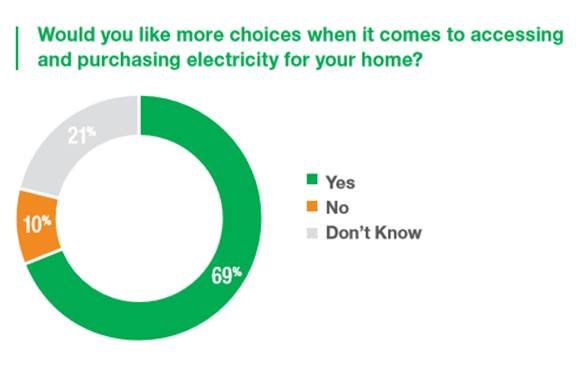Greentech Media: Headlines –
U.S. homeowners are concerned about the cost of solar, but want it as an option, according to a recent survey conducted by Zogby Analytics and commissioned by Clean Edge and SolarCity.
The survey found that 75 percent of U.S. homeowners opposed utilities limiting their access to alternative sources of electricity. It also showed that 73 percent of homeowners will buy solar from utilities that sell it — but they will buy it from other energy providers as well.

Source: U.S. Homeowners on Clean Energy: A National Survey
“This is the first poll, as far as I know, to deal with the issue of choice, and it shows utilities are at risk if they think there isn’t public opinion around…homeowners’ desire, whether through a utility, a third party, or on their own, to install systems that provide energy, energy storage and other utility services,” said Clean Edge Managing Director Ron Pernick.
Over three-fourths of homeowners are at least satisfied with their utilities, Pernick said. But 88 percent favor renewable energy, and 62 percent are interested in solar — and they will buy it elsewhere if the utility won’t offer it.
The survey shows that support for renewables is widespread across political party lines, but that dimension has been polled before, Pernick said. “This poll shows homeowners, whether self-defined as Republican, Democrat, or independent, want choice. And that is strongest, at 83 percent, among conservatives. Independents are at 73 percent. Liberals, at 57 percent, will accept the market being a little less open.”

Source: U.S. Homeowners on Clean Energy: A National Survey
“Many of the same free-market consumers who want the choice to not have a smart meter also want to protect their right to install their own distributed energy and storage systems,” the survey report notes in describing the Green Tea Coalition of Tea Party Republicans and Sierra Club environmentalists that allied to preserve solar incentives in Georgia.
Some utilities and energy services providers, like NRG, Next Era, and MidAmerican, get this, Pernick said. But there is a process of disintermediation happening at the grid edge that points to a major shift, and many utilities and regulators need to do a much better job of understanding it.
In addition to the two key insights that homeowners strongly support renewables and want energy choices, the survey turned up two other central conclusions.

Source: U.S. Homeowners on Clean Energy: A National Survey
The first is that homeowners take environmental impacts into consideration, but ultimately, economics determine their choices. Environmental impacts are important to 70 percent of homeowners, some 57 percent more than expressed such concerns three years ago. But economic considerations drive most purchasing decisions. Zero upfront costs and ongoing cost savings are the top two reasons homeowners are interested in solar.
The poll’s last overarching conclusion is that though renewables are becoming mainstream, perceived price barriers persist. Only 45 percent of the surveyed homeowners expressed awareness that solar power is now more affordable than it was three years ago because of the 50 percent drop in solar module prices in that time, as well as the fact that the cost of solar electricity now beats utility rates in many places.

From U.S. Homeowners on Clean Energy: A National Survey
The survey also found that the purchase of LED light bulbs is the leading anticipated clean-energy purchase by homeowners, with 37 percent of respondents describing themselves as likely to make such a purchase. That is followed by smart thermostats, at 11 percent, double- or triple-pane windows, at 10 percent, hybrid cars and Energy Star-rated hot water heaters, at 9 percent, and electric vehicles, at 7 percent.
Half of U.S. homeowners are interested in backup power, either because they have experienced a power outage or want to be ready for one. Three-fourths of those respondents say the cost of energy storage is the biggest factor in the decision about whether to make such a purchase, and 73 percent say the biggest factor is reliability.
“The survey, done in January of this year, is the first to ask many of these kinds of questions,” Pernick said. “We’re going to do it yearly and track these attitudes over time.”

Source: U.S. Homeowners on Clean Energy: A National Survey
(c) Greentech Media: Headlines – Read entire story here.